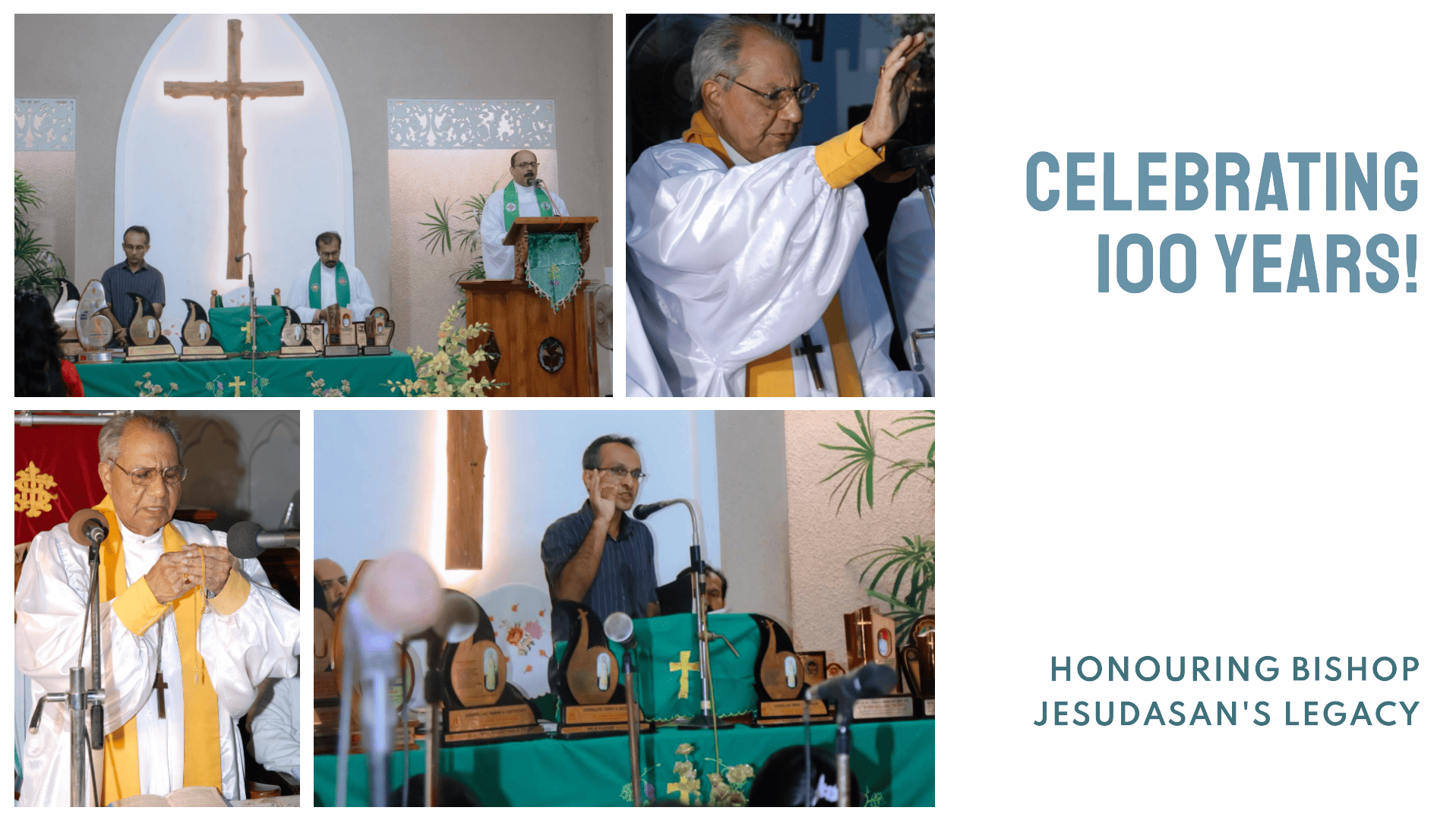Sunday Sermonettes #026
The Missed Photograph: An Anecdote
It was the time we had planned to prayerfully celebrate the 85th birthday of Bishop Jesudasan (February 14, 2010) with family members. I then had a desire to publish a Coffee Table Book that would compile photographs capturing the most significant and finest moments of the Bishop’s life and ministry. I thought it would serve as an inspiration for future generations.
For several days, I visited him at his home, trying to understand and document the defining moments of his official life.
During one such conversation, Bishop Jesudasan mentioned that during the LMS (London Missionary Society | Later renamed the Council for World Mission) bicentenary celebration in London in 1995, around the theme “Dare to Dream,” only three people were given the opportunity to speak at a special gathering. during the event. One of them was Queen Elizabeth of England. Another was Bishop Desmond Tutu, representing the African continent. And the third was Bishop Jesudasan, representing the Asian continent.
With great enthusiasm I asked my Uncle, “Do you have a photograph of that moment?”
His response deeply disappointed me: “Hey, we don’t go there to speak while thinking about taking photos!”
A man who never sought to preserve even a single photograph to showcase his own greatness—that was Bishop Jesudasan!
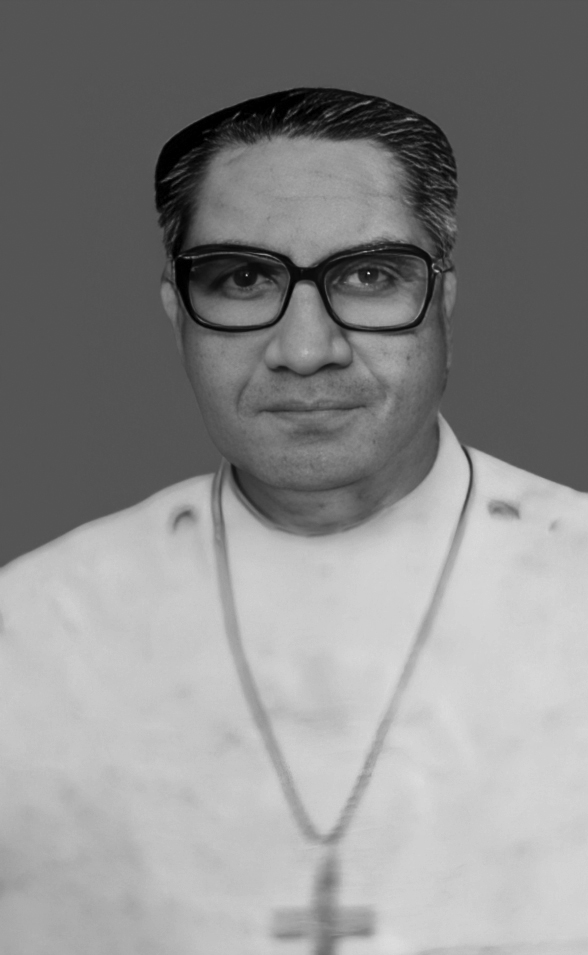
Bishop Jesudasan. That was how people lovingly called the late Most Rev. Dr. I. Jesudasan, who exhibited excellence in leadership in his ministry during his tenure as member of the Central Committee of World Council of Churches (WCC) (1983-1991), as Deputy Moderator (1980-’81) and then Moderator of the Church of South India (CSI) for three consecutive terms (1982 to 1988), and as the 3rd Bishop of South Kerala Diocese for 17 years regarded as the golden period in its history (1973 to 1990).
It was a period of holistic growth—spiritual, material, and social—for the diocese. Bishop Jesudasan, who exhibited brilliant and exceptional leadership in his ministry, led this growth from the front.”
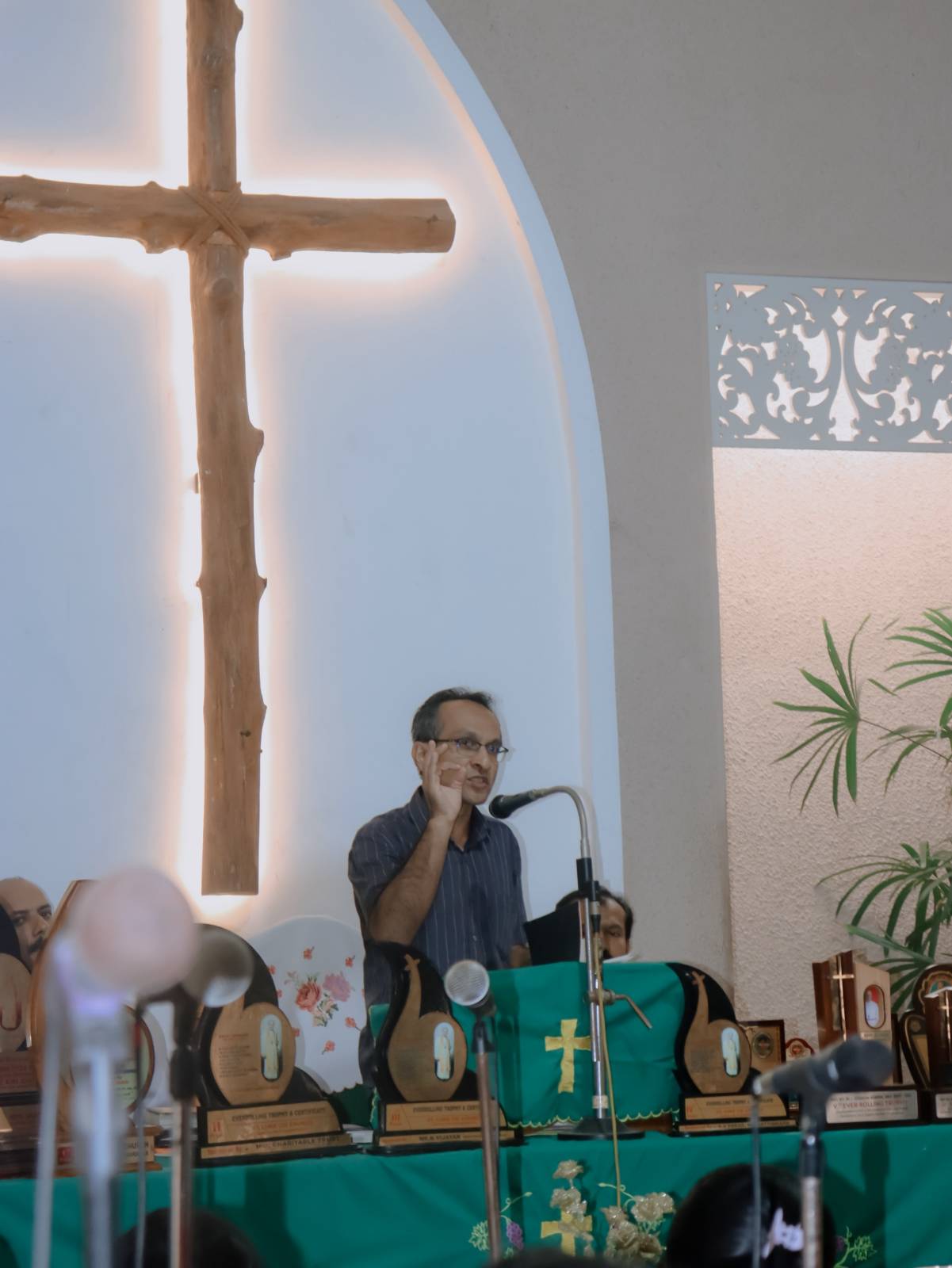
The sermon I had the joy, honour, and privilege of delivering on the occasion of the 100th birthday of Bishop Jesudasan, my Uncle, at the St. Luke’s CSI Church, Kariyilthottam, Amaravila, a village in Thiruvananthapuram on Sunday 16th February 2025, focused on the prayer life of Bishop Jesudasan. This church stands where his ancestral home had been and as his last wish it was deeded to the diocese to. build a church.
Excellence in Servant Leadership
Bishop Jesudasan considered himself a servant of Jesus. That is what is name means in his native tongue Malayalam. He found courage in the words of St. Paul, “We are fools for Christ” (1 Cor. 4:10). He showed no interest whatsoever in gaining anything for himself or acquiring fame. He never sought honour for himself. But God exalted this ordinary man, a humble servant of God, in extraordinary ways. Positions and honours sought him out.
Yet in spite of all that we consider his phenomenal achievements in church leadership, ecumenical and social standing; he asked that his tombstone bear the words from the Gospel of Luke (17:10). And also inscribe the words “An unworthy servant of the Lord, falls into they loving hands” along with it.
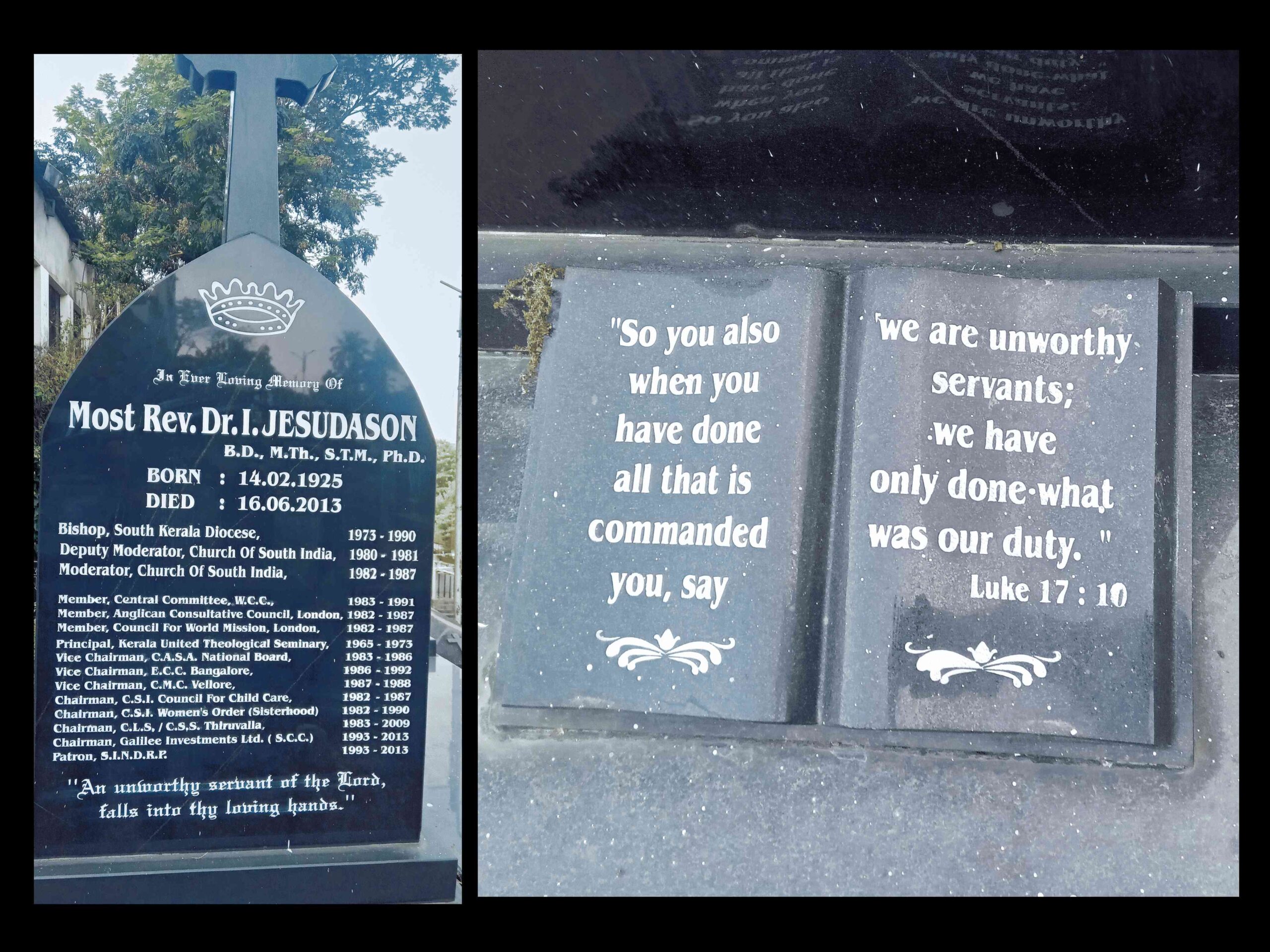
Excellence in Democratic Leadership
During his tenure as Bishop, he always gave space to everyone who had something to say, allowing them to share their opinions on the topic under discussion. He came to meetings well-prepared on the agenda items and listened attentively to those who held opposing views.
After everyone had their say, he would finally rise to speak. If someone attempted to interrupt him at that moment, he remained firm and, with decisive authority, declared, “Now the Bishop is speaking.” Those who tried to heckle him would then recognize his true leadership and settle down.
The Writing on the Wall of Time | Fiery Words
When he was the Moderator of the CSI (Church of South India), during a Synod (the highest decision-making body) meeting, some strongly argued that bishops should not retire. They reasoned that, like in other church denominations, CSI bishops should remain in office until death, as this would bring a sense of permanence to the role of a bishop. A heated, intense vocal debate ensued. What brought this debate to a decisive conclusion was the historic response given by Bishop Jesudasan.
Bishop Jesudasan. with his firmness and insight, spoke words that can be called the “writing on the wall of time”—fiery words worth noting:
“Are you permanent? Am I permanent? None of us is permanent.”
Later, in a private conversation, Bishop Jesudasan reflected on this decision, saying, “We must step aside for the new generation. Only they can move forward at the pace that the times demand.”
Excellence in Professional Leadership
He brought a sense of professionalism and a sense of purpose to the meetings he chaired. He never wasted time, was always punctual, and brought discipline to the meetings by conducting them in a business like fashion. After his demise, the then Moderator of the CSI remarked about “the presence of God he brought into every meeting.”
It was his daily habit of early morning quiet times with God in reading the Bible and prayer that helped him bring this kind of a godly leadership to all meetings. His private time with God gave him the professional edge in public life.
Excellence in Community Leadership
Bishop Jesudasan knew that a vast majority of the people God had called him to shepherd were poor, downtrodden and marginalized. His heart was always with them. Even the political leadership of the Indian State of Kerala irrespective of ideologies knew that his heart beat with the thoughts of helping the poor and brining them social justice.
He was gentle like a lamb and always approachable to the least among the people whom he served. But he was like a lion when he championed their cause for justice and spoke against all kinds of corruption within the church.
Excellence in Ecumenical Leadership
Jesus had prayed that his disciples be united in love, “That they all may be one (John 17:21 which is the motto of the Church of South India as well).” Bishop Jesudasan was always looking forward to making this prayer real and tangible by brining denominations together. He always relied on the Spirit of God to bring about this unity among God’s people. He truly championed that the kingdom of God is righteousness, peace and joy in the Holy Spirit (Ref. Romans 14:17).
There were several initiatives he took to make this unity happen at the grassroots level. Even today his ecumenical vision and farsightedness is held in high esteem. He maintained a warm and cordial relationship with the heads of other denominations and he was invited to many meetings organized by people of other faiths too.
Excellence in Spiritual Leadership
Bishop Jesudasan was a man of compassion and someone who would weep with the broken hearted. I have heard people describe him as an angel of God who visited them in their time of pain and suffering. His prayers had a tone of familiarity with God addressing him “You,” with reverence and adoration in simple childlike words.
He had a faithful habit of interceding with God for the personal needs of individuals, families, and churches. He observed a fast every Friday. Many were blessed through the fruit of his heartfelt prayers and tears on their behalf.”
His prayers echoed the praises of God. In crises, he stood firm and unshaken. and was often heard saying: “Praise be to Jesus,” and “Thanks be to God for his indescribable gift (Jesus)! His often repeated prayer was: “May the love of God that shone through Jesus on the cross . . .”
He authored many books and wrote many essays that showed his deep understanding of Scripture. He believed that when God’s people aligned themselves with God’s purposes the Spirt of God would move and transform not just individuals and families but entire communities.
An Anecdote
Let me share a radiant childhood memory of Bishop Jesudasan. One day, a group of about 20 people comprising of elders, women, and children arrived in a vehicle to meet him at the Bishop’s House located in the LMS compound. From their appearance, I felt they were from a poor church in a rural background.
Excellence in Cross-centred Theological Leadership
Bishop Jesudasan championed the truth that God had opened a new and living way through the blood of Jesus shed on the cross through which we could approach God (Hebrews 10:19, 20), find forgiveness of sins, and also reconciliation between God and men. He also believed that the victory over all evil is possible through the cross of Jesus and the love of God on exhibit there. He spoke passionately about how God came near to us in Jesus, the Word of God become flesh, human just like us.
His theology was cross-centred and people focused. This vision helped Bishop Jesudasan show great trust in God on one hand and be near to the people he shepherded with an empathetic and loving heart. He believed that God “leads us in triumphal procession in Christ and through us spreads everywhere the fragrance of the knowledge of him” (2 Corinthians 2:14).
ഒരാളായിരുന്ന
Excellence in The Voice of Leadership
Bishop Jesudasan had the grace of God lighting up his face. As a speaker he did not possess charisma in the way that word is popularly understood. Yet his sermons are remembered for their depth, clarity of thought, and grounding in God’s Word. Kindly see the analysis of his famous sermon, The Feast of Life, delivered at Vancouver Canada in 1983. As he had no vested interests—only the common good of the people he led—the political leadership of the State listened to his opinions with respect.
Excellence in Leadership in Team Building
Bishop Jesudasan was not a one-man show. He understood that culture can only be taught as it was lived out by the top church leadership.
Therefore, he found people of integrity and having a track record of excellence in their own respective fields and brought them to key roles in the church administration and activities. This teamwork was crucial to his success in leading the people. And he was very conscious of the contribution of every one of them. He was very particular about keeping personal relationships and rejoiced in the achievements of others. He encouraged everyone with his smiling face and words of appreciation.
The words he chose for his farewell speech as he stepped down from leadership truly reflect his philosophy of team work: “I planted the seed, Apollos watered it, but God made it grow.” (Words of St. Paul in 1 Corinthians 3:7).
Excellence in Leadership in Modelling Self-Introspection
Bishop Jesudasan had a manner of conduct that was dignified exhibiting a true knowledge of the Chair he occupied and elevating its stature in the eyes of all. This was more than evident in the way he made the CSI Moderator’s post an honoured one with his reputation of integrity and godly leadership. The more God exalted him in leadership roles, the more he humbled himself before God.
One of his unforgettable habits was to take a day off from all activities on 5th of August, the day he was consecrated as Bishop and spend the day in prayer reviewing and reflecting on whether he is staying true to the call of God in his life.
The cross was his touchstone. In one of his articles he wrote:
“Those who are respected as the best in society must examine themselves before the cross of Jesus Christ to realize how great sinners they are.”
(Christava Deepika: July 2010 Article titled: The Crucifixion of Jesus Christ and God’s Church—A Bird’s Eye View). His excellence in leadership was that he was willing to do this self-introspection standing in front of the cross of Jesus before he preached to others.
“Jesus, how beautiful is Your form to my eyes!
Make me, Your disciple, wholly like You.”
യേശുവേ നിന്റെ രൂപമീയെന്റെ
കണ്ണുകൾക്കെത്ര സൗന്ദര്യം
ശിഷ്യനാകുന്ന എന്നെയും നിന്നെ-
പ്പോലെയാക്കണം മുഴുവൻ.
The 282nd song from the Malayalam Hymn Book, which he particularly loved, was one he insisted the choir sing on his 85th birthday. This can be understood as a continuation of his practice of self-introspection:
Excellence in His Leadership Legacy
The legacy he left behind is that even today his name is spoken with great admiration as he had exhibited a life of humility (living in his small cottage in later years) even while he walked with dignity along with the great men of his times. Even today he is spoken of as a role model whom we can look up to and emulate.
He was a man faithful to God’s call on his life till the very last. He prayerfully continued to serve the people even after retirement from office.
He looked to the face of Jesus all his life and that look transformed his life from a lump of coal in obscurity and poverty to that of the enduring shine and brilliance of a diamond. In the words of many, “he was a saint and during his earthly life he truly reflected Jesus.”

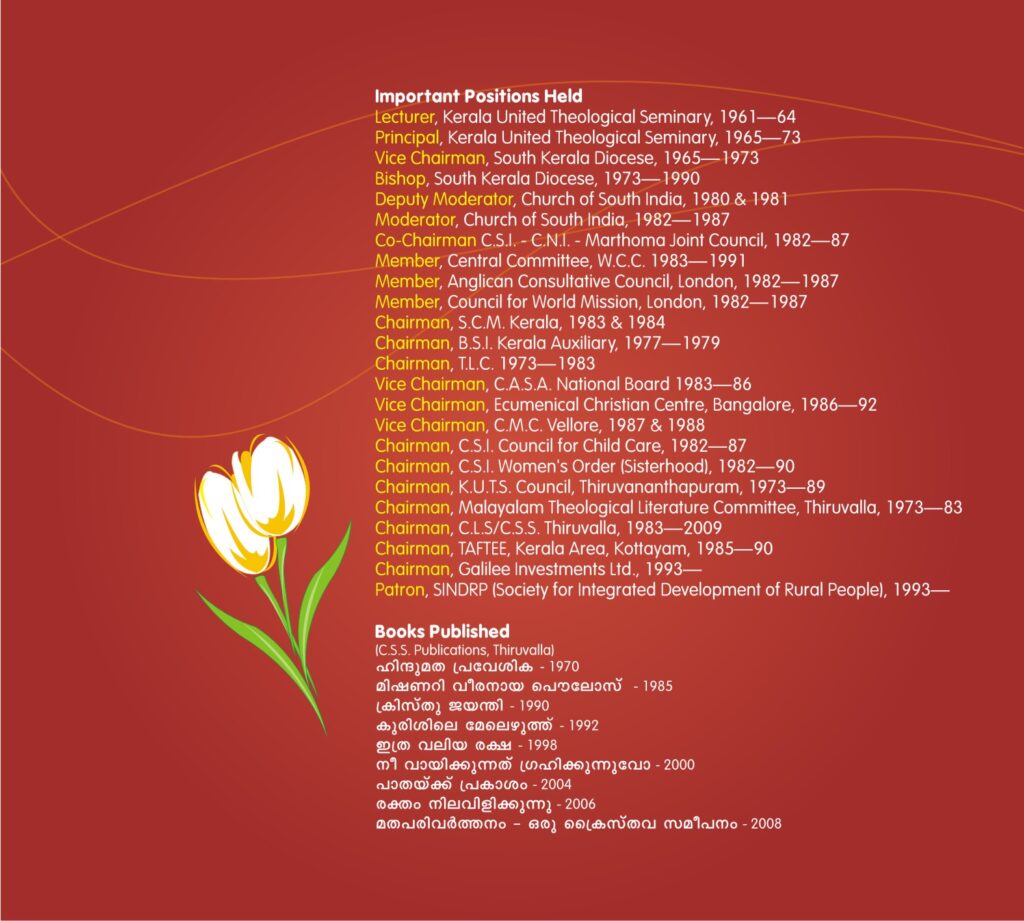
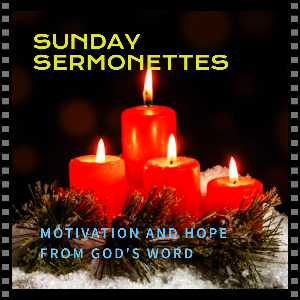
For further reading:
Bishop Jesudasan–A Short Speech of Tribute
ബിഷപ്പ് യേശുദാസൻ: ശുശ്രൂഷാനേതൃത്വത്തിലെ ഉത്കൃഷ്ടത
The Art and Craft of Sermons and Preaching
Are Sermons About God or Are They to Make You Feel Good?

